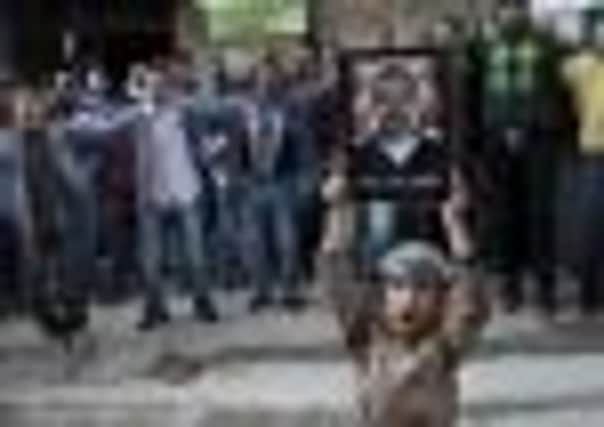Alex Warren: Syria faces a long and bloody road as conflict threatens to tear nation apart


No-one expected the “Friends of Syria” conference to result in dramatic action to stop President Assad’s increasingly brutal crackdown in the city of Homs, nor to halt the fighting that killed at least 5,400 people last year and many hundreds more since, including Sunday Times foreign correspondent Marie Colvin.
Instead, this was more of an exercise in being seen to do something. After a fractious meeting, the former United Nations secretary-general Kofi Annan was appointed as a special envoy and the group declared that it sought a “political solution” to the conflict – while demanding that the Syrian government allow in humanitarian aid.
Advertisement
Hide AdAdvertisement
Hide AdIf anything, the outcome only highlighted the difficulty of exerting pressure on an entrenched regime in a country where more is at stake than any other touched by the Arab Spring.
What happens in Syria has always rippled far and wide, and all sides in the battle for its future are entangled in a web of complications that augurs poorly for a resolution of the sort that saw Tunisia’s Zine al-Abidine Ben Ali flee into exile last January after just weeks of protests, or Libya’s Muammar Gaddafi executed at the hands of Nato-backed rebels in October. Syria faces a much longer, bloodier road ahead.
Assad’s military forces, in which his brother Maher plays a key role, are being stretched and have suffered defections but do not seem in imminent danger of collapse.
The best-trained and best-equipped elements are thought to contain high proportions of Alawites, members of the minority religious sect to which the Assad family themselves belong, and who have much to lose should there be a change of power in Damascus. They have every reason to fight.
Advertisement
Hide AdAdvertisement
Hide AdSyria’s patchwork of other religious and ethnic minorities has also helped to dilute resistance. The Christian community, estimated to make up around a tenth of the country’s 24 million people, are wary of a more Islamist and less religiously tolerant Syria if Assad were to go, and have largely stayed on the sidelines of the revolt.
The Kurdish population, concentrated in the impoverished north-east, have long been neglected by Damascus but they too are wary of being marginalised and remain suspicious of Turkey, which has made strident calls for Assad to step down.
Another problem is the fractured nature of the opposition itself. The most prominent group to emerge is the Syrian National Council (SNC), which the Tunis meeting declared as “a legitimate representative of Syrians seeking democratic change”. But its leadership is in exile and it does not control any territory inside the country.
Not all the anti-Assad groups are aligned with the SNC, nor agree with its strategy, and in the past week alone several new groups have cropped up. All this makes it difficult for foreign countries to throw their weight behind a single group, as several – including the UK – did with Libya’s National Transitional Council this time last year.
Advertisement
Hide AdAdvertisement
Hide AdAnd unlike Gaddafi, whose inability to court overseas allies left him fatally exposed, Assad has a useful hand of international cards to play. Hezbollah, the Shi’ite Islamist group allied with Damascus and Tehran, is the single most powerful military force in neighbouring Lebanon and also part of its largest parliamentary bloc. Iran has stood by Assad, reflecting the wider cold war with its Gulf rival, Saudi Arabia, whose foreign minister complained about the ‘inactivity’ of last week’s meeting.
Russia and China, each for their own reasons, vetoed a UN resolution earlier this month that would have condemned Assad’s crackdown. Two of Syria’s neighbours, Iraq and Lebanon, remain friendly enough with Damascus that they will not seal their borders to impose any economic sanctions. And while Assad may be running out of money, his overseas allies are unlikely to let either his coffers, or his military arsenal, dry up.
That many of those cards still remain unused is a sign that Damascus does not yet feel under extreme pressure. We do not know how Hezbollah or Iran would react to a foreign attack on Syria, nor to an Assad regime that really was on its last legs. It seems no-one wants to take the responsibility of finding out the answer.
The most likely scenario now is a grim, drawn-out proxy war, perhaps with Gulf states like Saudi Arabia or Qatar arming one side, and Iran and Russia propping up the other. Even Clinton, the US Secretary of State, acknowledged that the rebels “will, from somewhere, somehow, find the means to defend themselves as well as begin offensive measures”.
That conflict may eventually bring down the family that has ruled Syria for more than four decades, but it will not happen quickly, and it could tear apart the country in the process.